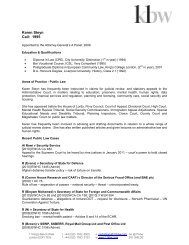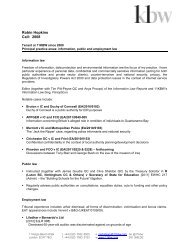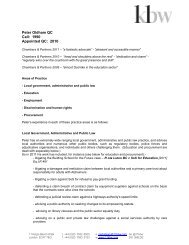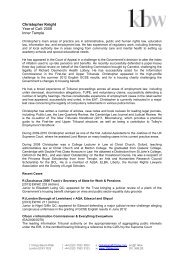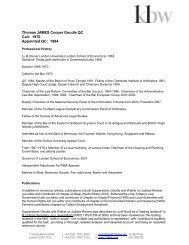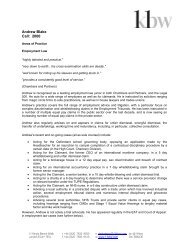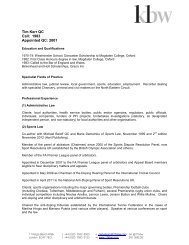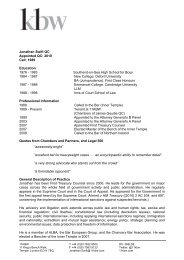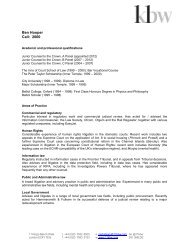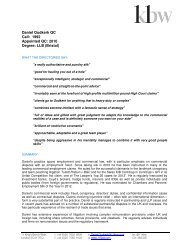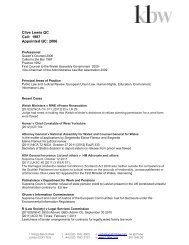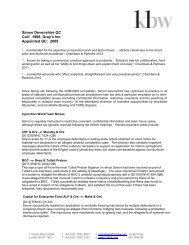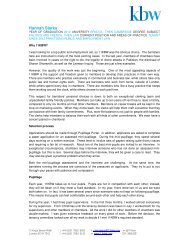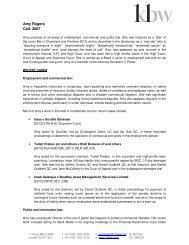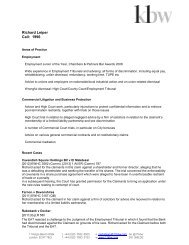THE PUBLIC SECTOR EQUALITY DUTY Joanne Clement - 11kbw
THE PUBLIC SECTOR EQUALITY DUTY Joanne Clement - 11kbw
THE PUBLIC SECTOR EQUALITY DUTY Joanne Clement - 11kbw
Create successful ePaper yourself
Turn your PDF publications into a flip-book with our unique Google optimized e-Paper software.
on members of protected groups. Unsurprisingly Blake J held that the first decision<br />
was unlawful as the equality duties had not been complied with as there was no<br />
evidence that each of the decision-makers were aware of the duty and how it was<br />
engaged [32]-[33].<br />
52. When the decision was re-taken with the benefit of the EIA, Blake J found that the<br />
duties had still not been properly discharged as the EIA was defective, having<br />
focused upon the advantages to be derived from a new policy rather than the degree<br />
of disadvantage to existing users of terminating funding arrangements until new<br />
arrangements could be put in place [35(1)]. He also found that the EIA had not been<br />
based on adequate consultation and consultation was particularly important where<br />
the council relied on a user survey which did not provide the relevant information<br />
[35(2)-(3)]. The expectation of consultation was also enhanced by communications<br />
suggesting that service users would be involved in commissioning [35(6)]. Blake J<br />
also held that the statutory equality duties require due regard to be had to the<br />
statutory need, not simply to the EIA, and decision-makers need to have due regard<br />
to all the evidence of prejudice and what might reasonably be done to mitigate it,<br />
even if that material is not in the EIA [35(7)]. It was “striking” that the case for<br />
continuing the existing service, at least in some areas where no alternatives existed,<br />
was never put in the reports before members or the decisions [36]. The Judge further<br />
pointed out that the fact that it is for a public authority to determine the weight to<br />
attach to countervailing factors can only be of assistance to a defendant where they<br />
have complied with the duty to have due regard to the statutory needs (see [37]).<br />
53. Blake J provided something of a warning to local authorities hoping to rely on the<br />
inherent difficulty of the decisions facing them [46]:<br />
“…Even where the context of decision making is financial resources in a<br />
tight budget, that does not excuse compliance with the PSEDs and indeed<br />
there is much to be said for the proposition that even in the straightened<br />
times the need for clear, well-informed decision making when assessing<br />
the impacts on less advantaged members of society is as great, if not<br />
greater. In general terms I consider the advice recently issued in nonstatutory<br />
guidance by the Equality and Human Rights Commission ("Using<br />
the equality duties to make fair financial decisions") to be of assistance to<br />
decision makers such as this defendant in the no doubt very difficult<br />
decisions that have to be taken in this field…”<br />
54. The second Birmingham case is R (W) v Birmingham City Council [2011] EWHC<br />
1147 (Admin), (2011) 120 BMLR 134. In a voluminous 100 page judgment Walker J<br />
granted judicial review of the council’s decision to alter its eligibility threshold for adult<br />
social care from “substantial” to “critical” (as assessed using the FACS guidance).<br />
55. In December 2010 the council had issued a consultation document on the future of<br />
adult social services. The consultation period was to run until 2 March 2011. Option 2<br />
<strong>Joanne</strong> <strong>Clement</strong>, 11KBW<br />
t. 020 7632 8500 e. <strong>Joanne</strong>.<strong>Clement</strong>@<strong>11kbw</strong>.com<br />
18



